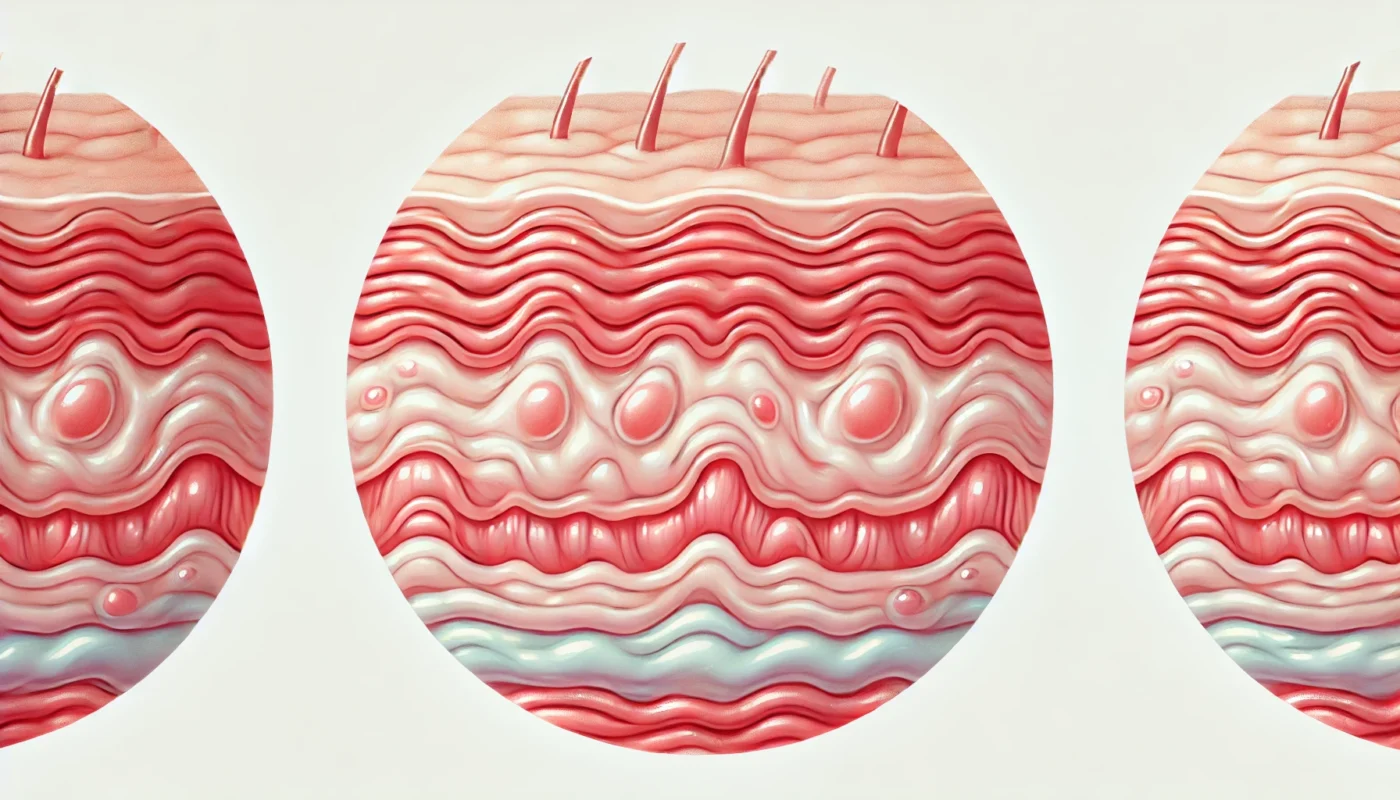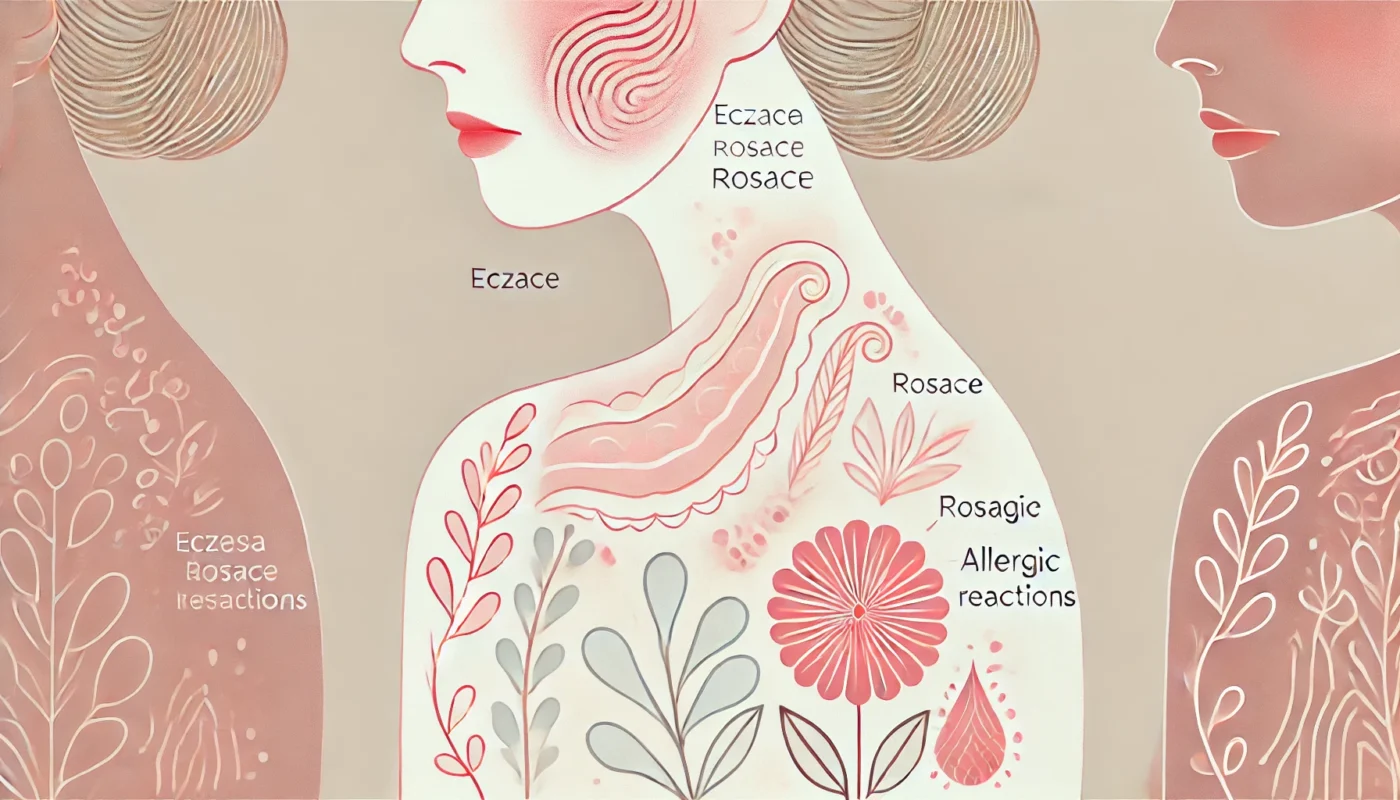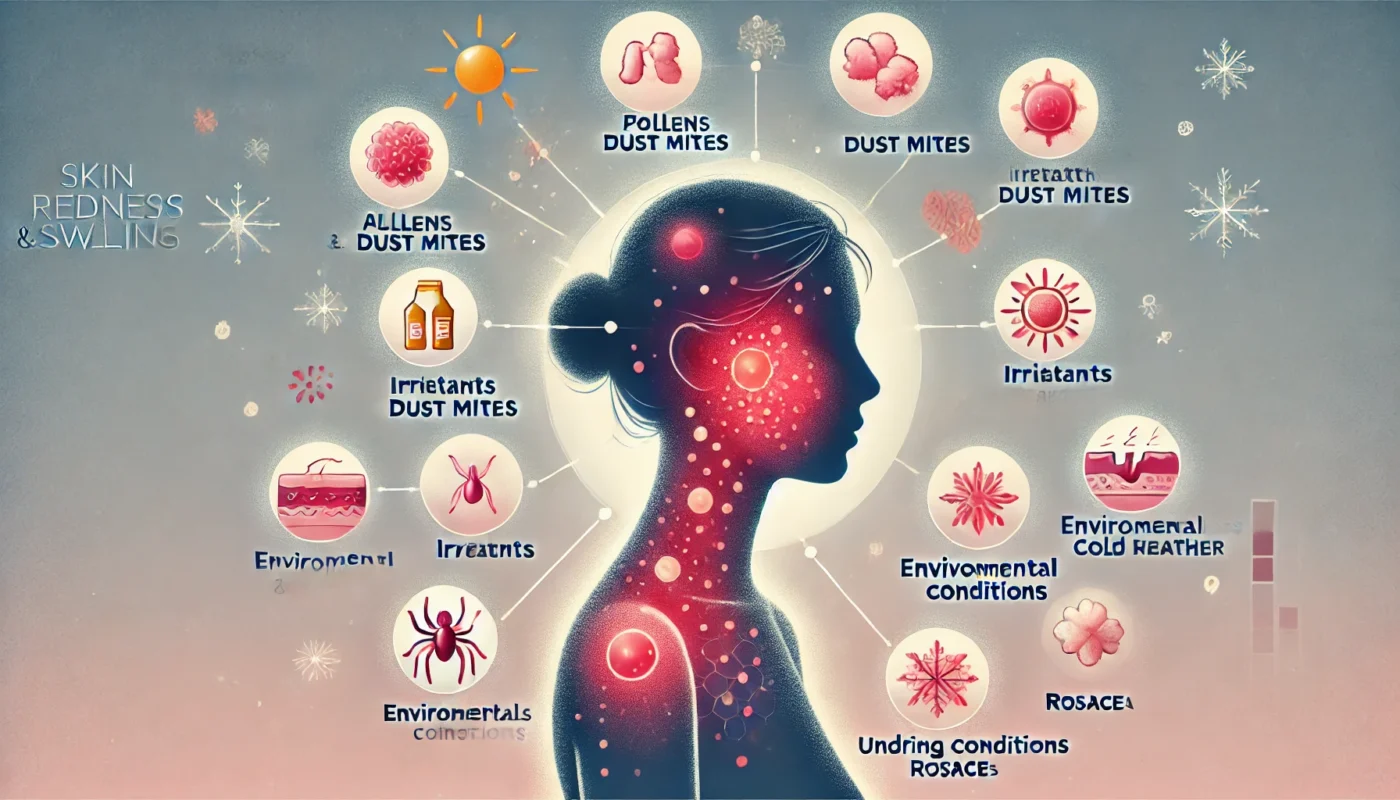Inflammation is the body’s natural response to injury or infection, and while it serves a protective role, chronic inflammation can lead to persistent redness and swelling. Scientifically, inflammation involves the activation of immune cells that release cytokines—proteins that mediate and regulate immunity and inflammation. When it comes to the skin, the inflammation process can manifest as redness, swelling, heat, and sometimes pain.
You may also like: 20 Powerful Anti-Inflammatory Foods
Immune System’s Role in Skin Inflammation
The immune system plays a central role in the inflammation process. When a threat is detected, immune cells like macrophages and neutrophils rush to the site to neutralize the danger. This response is vital for healing but can become problematic if overactive. Chronic activation may lead to persistent skin issues, highlighting the importance of understanding how immune responses are triggered and regulated.
Cytokines and Their Impact
Cytokines are signaling proteins that orchestrate the immune response. They can promote inflammation (pro-inflammatory cytokines) or suppress it (anti-inflammatory cytokines). An imbalance in these proteins often results in excessive inflammation, contributing to skin redness and swelling. Research into cytokine profiles can offer insights into targeted treatments for inflammatory skin conditions.
The Process of Skin Inflammation
Once the immune system is activated, the process of inflammation unfolds in stages. Initially, blood vessels dilate to increase blood flow, resulting in redness and warmth. Subsequently, increased permeability allows immune cells to migrate to the affected area, causing swelling. Understanding each step can help in developing interventions that interrupt this cascade, providing relief from symptoms.
Common Triggers of Skin Inflammation
Several factors can trigger skin inflammation. Understanding these can help in identifying the root cause of your symptoms:
Allergens and Irritants
Exposure to certain chemicals, cosmetics, or even natural substances like pollen can cause an allergic reaction or irritant contact dermatitis. These reactions are characterized by a compromised skin barrier, allowing irritants to penetrate and trigger an inflammatory response. Identifying specific allergens through patch testing can be crucial in managing and preventing flare-ups.
Infections and Their Consequences
Bacterial, viral, or fungal infections can lead to inflammation. Conditions like cellulitis and impetigo, caused by bacteria, result in pronounced redness and swelling. Viral infections such as herpes simplex can also cause inflammatory responses. Proper diagnosis and treatment are essential in managing infection-induced inflammation, preventing complications and recurrence.
Autoimmune Disorders
Conditions such as lupus or psoriasis involve the immune system mistakenly attacking healthy skin cells, leading to inflammation. These disorders are complex and often require a multidisciplinary approach for effective management. Understanding the autoimmune nature helps in tailoring treatments that modulate the immune response, reducing symptoms and improving quality of life.
Environmental Factors
Sun exposure, pollution, and extreme temperatures can damage the skin barrier and trigger inflammation. Ultraviolet (UV) rays, for instance, can lead to sunburn, causing inflammation and long-term damage. Pollution introduces free radicals that exacerbate inflammation. Protective measures, such as sunscreens and antioxidants, can mitigate environmental impacts on the skin.
Diet and Lifestyle
High intake of sugar, processed foods, and alcohol can exacerbate inflammation. These dietary habits influence systemic inflammation, impacting skin health. Stress and lack of sleep also play a significant role in inflammatory processes. Understanding the link between lifestyle factors and inflammation can empower individuals to make healthier choices, reducing skin issues.
Why Does My Skin Get Swollen and Itchy?
Swelling and itchiness are often companions to redness and can stem from similar inflammatory processes. Histamines, another type of protein released during inflammation, are primarily responsible for the sensation of itchiness. They cause the small blood vessels in your skin to leak, leading to swelling.
The Role of Histamines
Histamines are compounds released by mast cells during allergic reactions and inflammation. They bind to receptors in the skin, causing blood vessels to dilate and become more permeable. This process results in the classic symptoms of itching and swelling. Understanding how histamines work can guide the use of antihistamines to alleviate these uncomfortable symptoms.
Identifying Itch Triggers
Various factors can trigger the release of histamines, including allergens, stress, and temperature changes. Identifying personal itch triggers can be crucial in managing symptoms. This may involve keeping a diary to track flare-ups and consulting with a healthcare provider for skin testing, leading to a more tailored management plan.
Managing Swelling and Itchiness
Effective management of swelling and itchiness involves both immediate and long-term strategies. Immediate relief can be achieved with cool compresses and over-the-counter antihistamines. Long-term management focuses on avoiding triggers and maintaining a healthy skin barrier through proper skincare and lifestyle adjustments, reducing the frequency and severity of symptoms.
How to Reduce Skin Inflammation and Redness
Addressing skin inflammation effectively requires a multi-faceted approach:
Identify and Avoid Triggers
Keeping a skin diary to track flare-ups can help pinpoint potential irritants or allergens. By documenting symptoms alongside potential triggers such as foods, skincare products, and environmental factors, patterns can emerge. This proactive approach allows for the elimination or avoidance of specific triggers, reducing the likelihood of future flare-ups.

Topical Treatments for Relief
Over-the-counter hydrocortisone creams can reduce inflammation. These treatments work by suppressing the immune response and decreasing cytokine production. For more severe cases, a dermatologist may prescribe stronger anti-inflammatory medications such as topical steroids or calcineurin inhibitors, providing more effective relief.
The Role of Cool Compresses
Applying a cool, damp cloth to the affected area can provide immediate relief by reducing blood flow and cooling the skin. This simple method can be especially effective in soothing acute flare-ups, minimizing discomfort, and preventing further irritation. Regular use of cool compresses can complement other treatments, offering a holistic approach to managing skin inflammation.
Exploring Natural Remedies
Ingredients like aloe vera, chamomile, and calendula have anti-inflammatory properties. These natural ingredients can soothe irritated skin and promote healing. Essential oils such as lavender and tea tree oil may also help but should be used with caution to avoid irritation. Incorporating these remedies into a skincare routine can provide gentle, effective support for inflamed skin.
How to Get Rid of Inflammation on Skin
For those seeking long-term solutions, consider these strategies:
Adopt an Anti-Inflammatory Diet
Foods rich in omega-3 fatty acids, antioxidants, and fiber can help reduce systemic inflammation. Consider incorporating the following into your diet:
- Fatty Fish: Salmon, mackerel, and sardines are high in omega-3s, which have been shown to reduce inflammation and improve skin health.
- Leafy Greens: Spinach and kale are packed with antioxidants that combat free radicals, reducing inflammation and promoting a healthy complexion.
- Nuts and Seeds: Almonds and flaxseeds provide essential nutrients that support skin health and reduce inflammation.
- Fruits: Berries and cherries are known for their anti-inflammatory properties, offering a delicious way to support skin health.
Lifestyle Modifications for Better Skin
- Stress Management: Practices such as yoga, meditation, and deep-breathing exercises can lower stress levels and, consequently, inflammation. These activities promote relaxation and reduce the release of stress hormones that exacerbate inflammation.
- Adequate Sleep: Prioritize 7-9 hours of quality sleep per night to allow your skin to repair and regenerate. Sleep is crucial for maintaining a balanced immune response and reducing inflammation.
- Regular Exercise: Physical activity boosts circulation and helps maintain a healthy immune system. Exercise promotes the release of anti-inflammatory cytokines, supporting overall skin health.
Topical and Prescription Treatments for Persistent Inflammation
For persistent inflammation, consult a dermatologist who can provide tailored advice and treatments. Options may include:
- Prescription Creams: More potent than over-the-counter options, these can effectively reduce inflammation and are tailored to specific skin conditions.
- Oral Medications: In some cases, oral anti-inflammatory drugs or antibiotics may be necessary to manage severe inflammation, especially when linked to underlying health conditions.
Immediate Relief for Inflamed Skin
When you need immediate relief, consider the following:
Hydrocortisone Cream for Quick Relief
Available over-the-counter, hydrocortisone cream can provide fast relief for mild flare-ups. It works by reducing the skin’s inflammatory response, soothing itching and redness. For best results, apply as directed and avoid prolonged use to prevent potential side effects.
The Efficacy of Antihistamines
Oral antihistamines can reduce itching and swelling by blocking the action of histamines in the skin. These medications are particularly useful for allergy-induced skin reactions, providing prompt symptom relief. They can be a valuable addition to a comprehensive skin care plan, especially during allergy seasons.
Soothing Oatmeal Baths
Colloidal oatmeal can soothe irritated skin and reduce inflammation. Its anti-inflammatory properties make it an ideal treatment for various skin conditions, from eczema to sunburn. Adding colloidal oatmeal to bathwater creates a calming environment that promotes healing and hydration.

How to Prevent Skin Inflammation
Prevention is always better than cure. Here are some preventative measures:
Sun Protection Strategies
Use a broad-spectrum sunscreen daily to prevent UV-induced inflammation. Sunscreen helps shield the skin from harmful ultraviolet rays that can cause damage and trigger inflammatory responses. Wearing protective clothing and seeking shade during peak sun hours can further enhance sun protection efforts.
Opt for Gentle Skincare Products
Choose products free from alcohol, fragrances, and dyes to minimize irritation. Gentle skincare routines support the skin’s natural barrier, preventing inflammation and promoting overall skin health. Patch testing new products can help identify potential irritants before full application.

The Importance of Regular Moisturization
A good moisturizer maintains the skin barrier and prevents irritation by locking in moisture. Hydrated skin is less prone to inflammation, making regular moisturization a crucial component of skin care. Selecting a moisturizer suitable for your skin type ensures optimal hydration and protection.
By understanding the underlying causes and employing a combination of dietary, lifestyle, and topical strategies, you can effectively manage skin redness and swelling. It’s important to remember that while home remedies can offer relief, persistent or severe symptoms warrant a consultation with a healthcare professional to rule out any serious underlying conditions.
Further Reading:
The Ultimate Guide to Skin Inflammation: Causes & Treatment
Fatty Fish, Leafy Greens, Nuts and Seeds, Fruits, Skin Health, Inflammation, Stress Management, Sleep, Exercise, Topical Treatments, Prescription Treatments, Hydrocortisone Cream, Antihistamines, Oatmeal Baths, Sun Protection, Skincare Products, Moisturization, Skin Care, Health Tips
Important Note: The information contained in this article is for general informational purposes only, and should not be construed as health or medical advice, nor is it intended to diagnose, prevent, treat, or cure any disease or health condition. Before embarking on any diet, fitness regimen, or program of nutritional supplementation, it is advisable to consult your healthcare professional in order to determine its safety and probable efficacy in terms of your individual state of health.
Regarding Nutritional Supplements Or Other Non-Prescription Health Products: If any nutritional supplements or other non-prescription health products are mentioned in the foregoing article, any claims or statements made about them have not been evaluated by the U.S. Food and Drug Administration, and such nutritional supplements or other health products are not intended to diagnose, treat, cure, or prevent any disease

